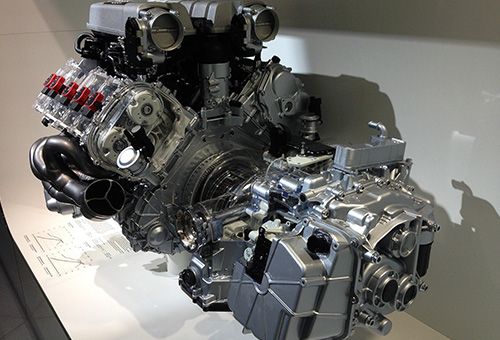Discover Reliable Used Engines for Sale at Affordable Prices Near You
Essential Factors To Consider for Ensuring High Quality and Durability in operation Engines
When considering the acquisition of an utilized engine, guaranteeing its high quality and longevity calls for a multifaceted technique. Maintenance history is a crucial aspect, as it gives understanding right into the engine's previous treatment and potential future integrity. Beyond paperwork, a thorough assessment of physical parts-- such as belts, hoses, and seals-- can expose covert concerns. Efficiency testing is also critical, supplying a picture of the engine's operational efficiency. Comprehending the subtleties of these analyses and their effects can be complicated. What are the vital strategies that can be used to browse this complex assessment process efficiently?
Engine History Assessment
In the world of made use of engines, a thorough engine history examination is paramount to making sure top quality and dependability. Understanding an engine's past can provide important understandings into its efficiency capabilities and prospective future longevity. A meticulous history review includes several essential facets that play a considerable function in analyzing an engine's problem. First of all, maintenance documents are essential. Routine maintenance, consisting of oil modifications, filter replacements, and arranged tune-ups, indicate that the engine has actually been well-cared-for, minimizing the probability of unforeseen failings.
Engines that have actually undergone considerable repair work may have underlying problems that might resurface. Taking a look at the engine's mileage can serve as a sign of wear and tear. An engine used mostly for long-distance highway driving might be in much better condition than one subjected to constant stop-and-go city website traffic.
Fundamentally, an extensive investigation into an engine's history is necessary for making informed acquiring decisions. used engines for sale.
Comprehensive Evaluation Guide
While comprehending an engine's history provides important context, a thorough evaluation is the following action to guarantee its present condition straightens with historical data. The examination should begin with an aesthetic evaluation, inspecting for indicators of leaks, corrosion, and unusual wear. Examine the outside for oil stains or coolant marks, which may show underlying issues.
Next, assess the engine's installing system for any kind of loose screws or abnormalities that could affect efficiency. Pay attention to the condition of belts and tubes, as these elements are vital for optimal engine performance. Examine for fractures, fraying, or any kind of indications of wear and tear.

Recognizing Damage
Acknowledging signs of deterioration is essential for assessing a made use of engine's durability and dependability. It involves a careful examination of various engine parts to establish their current state and potential future performance. Usual indicators include noticeable deterioration, which can influence metal parts and endanger structural stability. Rust on or around the engine block, cyndrical tube heads, and exhaust manifolds is particularly concerning.
One more important facet is evaluating the engine's seals and gaskets. These components are vital for maintaining appropriate stress and avoiding liquid leaks. Evidence of oil leaks or used gaskets often suggests deterioration, possibly bring about more extreme issues if not addressed immediately. In addition, uncommon noises during engine procedure, such as knocking or ticking sounds, may show interior damage or excessive wear on moving components like pistons or bearings.
The problem of belts and hose pipes is just as essential, as they play an important duty in the engine's overall function. Fractured or frayed belts and fragile tubes are signs of maturing that can cause engine failure if overlooked. Lastly, examining the oil problem and filter can give understandings right into previous upkeep practices, as filthy oil or blocked filters recommend disregard and increased wear.
Efficiency Screening Fundamentals
Assessing the damage of engine components sets the stage for a comprehensive assessment via performance testing. Efficiency screening works as an essential measure in establishing the functional stability of an utilized engine. By replicating real-world conditions, it evaluates the engine's ability to deliver power efficiently and accurately. Secret metrics include horsepower, torque, fuel effectiveness, and exhausts degrees. This information provides Going Here beneficial understandings into the engine's current efficiency and helps determine potential concerns that might not be instantly visible.
Making use of dynamometers is a typical technique in efficiency testing. These devices gauge the engine's outcome throughout different conditions, using an in-depth profile of its capability. Furthermore, on-road testing enhances dynamometer analyses by observing engine habits under typical driving scenarios, guaranteeing it satisfies the called for standards for both safety and effectiveness.
Advanced analysis devices even more enhance the ability to identify underlying problems. These devices evaluate engine monitoring systems, determining faults in digital elements that could influence efficiency. Comprehensive testing not only confirms the engine's operational condition however additionally help in forecasting future upkeep requirements. This makes sure the made use of engine can supply trusted efficiency over an extended duration, therefore optimizing its value and life span.
Upkeep and Treatment Tips
Proper maintenance and care are crucial to extending the life expectancy of a used engine and ensuring its regular efficiency. Normal oil modifications are vital; making use of the manufacturer's suggested oil kind and quality can prevent too much wear and tear. Furthermore, oil filters ought to be changed simultaneously to keep optimal lubrication and cleanliness within the engine.
Checking fluid levels, including coolant, transmission liquid, and brake fluid, is important. Making sure these liquids are at suitable degrees aids stop overheating and other mechanical concerns. Checking belts and tubes for indicators of wear, such as cracks or fraying, can avoid prospective failings that might bring about expensive fixings.
Routine examination of the air filter is also needed, as a tidy filter makes certain reliable air flow and burning, therefore maximizing engine performance. Ignition system ought to be inspected and changed when needed to preserve efficient gas burning and prevent engine misfires.
Finally, routine analysis checks using professional tools can determine potential problems prior to they come to weblink be substantial troubles. By sticking to these upkeep and care suggestions, utilized engine owners can ensure their engines continue to be reputable, efficient, and qualified of carrying out well over a prolonged duration.
Conclusion
